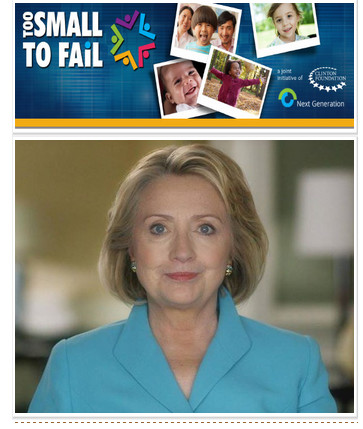From Hillary Clinton's Too Small to Fail: Play Pays

“Laughter is timeless, imagination has no age, and dreams are forever.” Walt Disney
When
young children dress up as superheroes or doctors, or imagine that a
cardboard box is a spaceship landing on the moon, they are taking part
in pretend play. By pretending, children build their social and
emotional development, and learn vital life skills, all while having
fun.
Children explore their feelings about new situations and
interactions with people through pretend play. Researchers have found
that imaginary play helps children learn how to control their emotions
and impulses by allowing them to practice first how they will speak or
act in any given situation. Much like adults might practice a speech in
front of a mirror, children use pretend play to prepare how they will
behave in real life. And when they engage in pretend play with other
children or adults, they learn how other people react in different
situations, too.
Pretend play also allows children to test out
language skills that they may otherwise be unsure of, as they talk out
loud about their actions and those of imaginary friends.
The best
kind of pretend play doesn’t require special toys or equipment: simple,
inexpensive items lying around the house work great. Parents can
encourage pretend play in their young children by providing them with
safe, household items like old clothing and recycled cardboard to prompt
their imaginations—and by joining in the fun, too!
Resources for Sharing:
- This article from PBS Parents suggests some ways that parents can encourage pretend play in young children.
- Research on the importance of imaginative, open-ended play from NPR.
- This article from Mister Rogers’ Neighborhood explains the benefits of pretend play, and offers tips for parents.
- These powerful quotes might inspire you to engage in imaginative role-play with your kids.
Listen
The
city of Berkeley, California has started a playground where adventure
and pretend play reign supreme for kids, starting from age 4. >>
When it comes to brain-building activities, nothing comes more naturally to babies and toddlers than play. Active play,
or play that gets kids moving, is important for the healthy development
of motor skills, muscles, and coordination. A baby is actively playing
when she stretches her tiny arms to reach for an object or starts to
crawl. For a toddler, it can be bouncing to the beat of a song you sing,
running down the sidewalk, or climbing stairs.
Active play gives
kids an opportunity to explore their surroundings, and is a fun way to
get the exercise they need. As they grow, young children need plenty of
time to stretch, run, jump, and play. In fact, the National Association for Sport and Physical Education
recommends that toddlers get at least 90 minutes of active time a day,
while preschoolers should get a full two hours. Getting that kind of
exercise regularly will boost your children’s long-term health, and
build healthy habits that will benefit them for the rest of their lives.
Active
play can happen almost anywhere. Parents and caregivers can head
outside with their children to take a walk, play tag at the playground,
or toss a ball. When at the playground, ask your child what she’s doing –
how high are you going to climb this time? How many times can you jump
rope? Walking is a good opportunity to exercise and describe the world
around you: what bugs do you see? What color are the leaves?
Families
can bring active play inside by having dance parties, acting out
stories, or better yet, inventing a new active game together!
Resources for Sharing:
- These tips for active play offer ways to get moving indoors and outdoors.
- Find great places to play near you with this map.
- NAEYC recommends 10 ways to explore the outdoors with your children.
Video
Dr.
Pooja Tandon of Seattle Children’s Research Institute talks about the
benefits of active play and has tips for busy families to get outside
more often. >>

